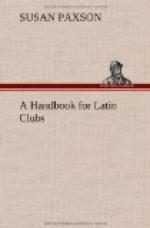LUXURY AND EXTRAVAGANCE AMONG AMERICANS.
Newport: The City of Luxury.
Jonathan T. Lincoln. Atlantic
Monthly. Vol. cii,
p. 162.
Housekeeping on Half-a-million a Year.
Emily Harington.
Everybody’s.
Vol. xiv, p. 497.
The Passing of the Idle Rich.
Frederick Townsend Martin. Chap.
ii, p. 23.
POEM.—Tempora Mutantur.
Poetical Works. John G. Saxe.
P. 98.
* * * * *
SELECTIONS THAT MAY BE USED
FOR THE PROGRAMS
* * * * *
A PLEA FOR THE CLASSICS[1]
A Boston gentleman declares,
By all the gods above, below,
That our degenerate sons and heirs
Must let their Greek and Latin go!
Forbid, O Fate, we loud implore,
A dispensation harsh as that;
What! wipe away the sweets of yore;
The dear “amo, amas, amat?”
The sweetest hour the student knows
Is not when poring over French,
Or twisted in Teutonic throes,
Upon a hard collegiate bench;
’Tis when on roots and kais and gars
He feeds his soul and feels it glow,
Or when his mind transcends the stars
With “Zoa mou, sas agapo!”
So give our bright, ambitious boys
An inkling of these pleasures, too—
A little smattering of the joys
Their dead and buried fathers knew;
And let them sing—while glorying that
Their sires so sang, long years ago—
The songs “amo, amas, amat”
And “Zoa mou, sas agapo!”
—Eugene Field
[Footnote in original book
(published 1916):
Copyright. Used by permission
of Charles Scribner’s Sons.]
ON AN OLD LATIN TEXT BOOK
I remember the very day when the schoolmaster gave it to me.... And I remember that the rather stern and aquiline face of our teacher relaxed into mildness for a moment. Both we and our books must have looked very fresh and new to him, though we may all be a little battered now; at least, my New Latin Tutor is. It is a very precious book, and it should be robed in choice Turkey morocco, were not the very covers too much a part of the association to be changed. For between them I gathered the seed-grain of many harvests of delight; through this low archway I first looked upon the immeasurable beauty of words....
What liquid words were these: aqua, aura, unda! All English poetry that I had yet learned by heart—it is only children who learn by heart, grown people “commit to memory”—had not so awakened the vision of what literature might mean. Thenceforth all life became ideal....
Then human passion, tender, faithful, immortal, came also by and beckoned. “But let me die,” she said. “Thus, thus it delights me to go under the shades.” Or that infinite tenderness, the stronger even for its opening moderation of utterance, the last sigh of Aeneas after Dido,—




